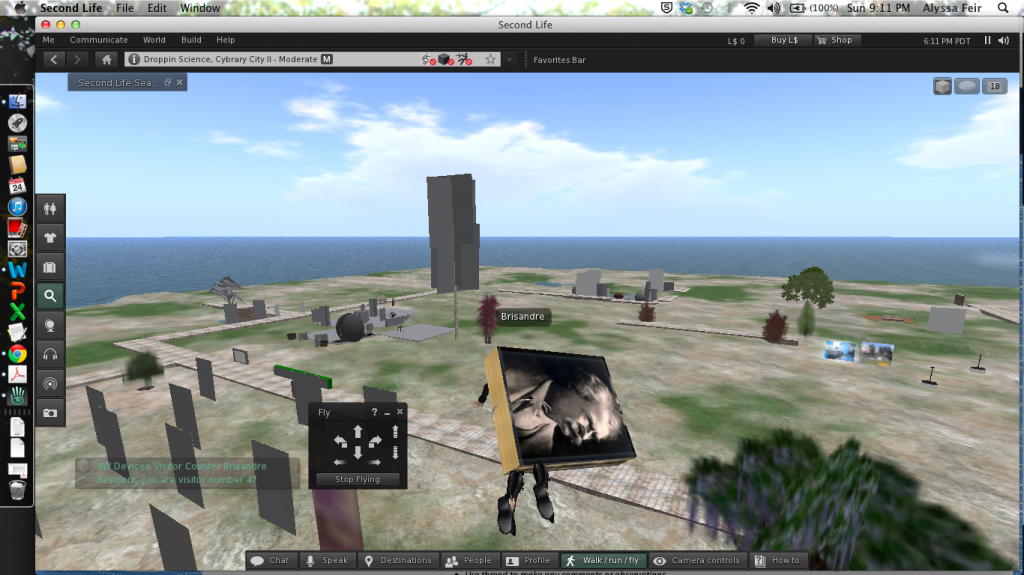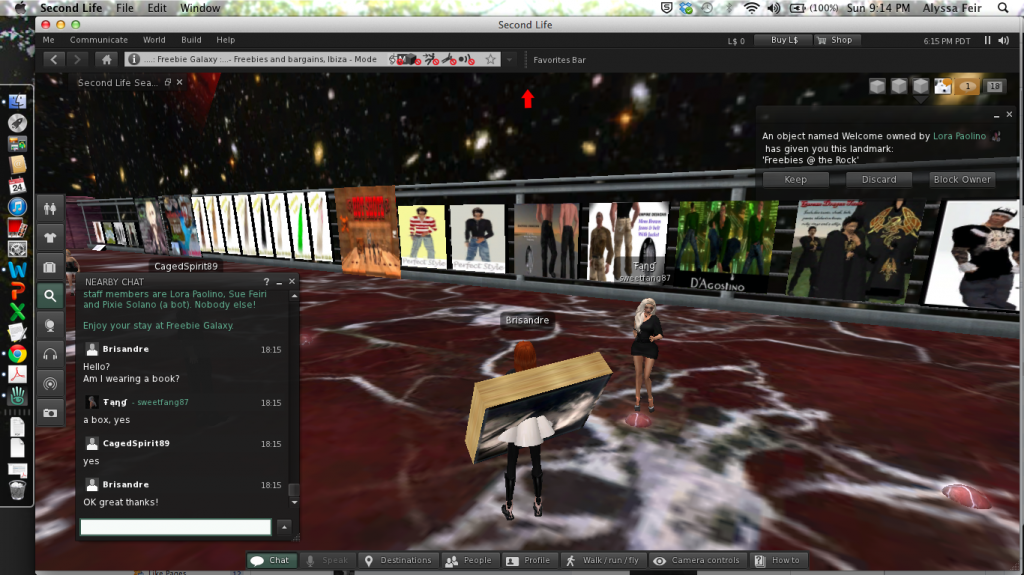Note: This post is adapted from my discussion post to Module VI – Immersion: Visit a virtual world, and tell us about your journey.
I decided to give Second Life a try. My first introduction to the virtual world of Second Life was a few years ago when my friend was completing his visual anthropology undergraduate thesis about the game.
Like others before me, I found the controls a little fussy. And trying to do simple things like change my outfit were quite difficult. I ended up wearing about 4 outfits at once before I realized what was happening.
I found my way to Illumination Library which describes itself as “one of SL’s finest library collections of literary classics, religious works, philosophy and history. Please enjoy reading, listening, and browsing through our interactive books.” When I first arrived in the library a LibriVox recording of Northanger Abbey started to play. I went into a different room and a LibriVox recording of one of Sir Arthur Conan Doyle’s novels started playing, and in another room another book. It was a little frustrating that I seemed to have no control over the audiobooks. I think this was a glitch because when I came back to the library later none of the audiobooks played automatically. I ‘touched’ Les Miserables and it opened an audiobook in my browser. I ended up listening to quite a number of chapters before bed. I actually find this a really neat feature. However, I don’t think I necessarily need to access these audibooks through SL as it is a bit cumbersome. It would be simpler to access these books directly through the LibriVox website.
I also was able to downloaded a copy of Adventures of Huckleberry Finn. I then somehow managed to wear the book. You can see my outfit in the picture below. At first I wasn’t sure if it was a glitch or not, so I went to a populated area and asked if I was wearing a book. The second picture below shows this scene. A helpful person named, sweetfang87, told me how to detach it and I was good to go. I chatted with a few people in this area. One of the conversations went downhill quickly with questions and comments like: “are you pretty in RL” and “I feel like I really like you”—it kind of reminded me of an ICQ chatroom in the late ’90s, very hit or miss.
After ditching the book I returned to Illumination Library and joined their literary group. They have a total of 251 members with three librarians. There were eleven other ‘book lovers’ online at 10:30pm EDT on a Sunday night. All three librarians had logged on sometime earlier that day. According to their group info, they have also run events in the past as well as notified the group of other events that may be of interest in SL. For example, this posting from St. Patrick’s Day:
The Royal Opera House presents “Celtic Odori”. Little Yoshiwara Geishas will be performing stories and dances in celebration of the Saint Patrick Day. Little Yoshiwara is the flagship of all Okiyas in SL. We cordially invite all members, their families and friends to attend the special Geisha performance today at 1 pm SLT. TAXI: http://slurl.com/secondlife/Beregovoi/61/86/56
The library also has a card catalog which can be touched. This will redirect you to a Google Doc of all of the books in the library and in which room they can be found.
It was an interesting experience, but I’m not sure if this is necessarily the easiest way for patrons to access audiobooks. They are all available through the LibriVox website—in addition to any that your local library might offer.
That being said, I did think of a few ways that this particular library in Second Life could be used by different groups:
- Book club meetings. Stock the audiobooks that you are reading so group members can find them easily. Then you could use the chat and voice chat functions to hold discussions.
- Literary lecture series. The text is made available for easy access and then you gather for a lecture and questions.
- Study group. Students could gather and listen to chapters together and then discuss using the various chat functions.
All in all my experience with Second Life was positive. I do think that there are ways for librarians to make it work for them and their patrons. I think it was mentioned earlier in this module that librarians working with housebound patients find tools like Second Life quite helpful. This article, although old and not related to librarians, makes a similar point. The article talks about an Atlanta rehab clinic that offers ongoing therapy sessions through Second Life (Mollman, 2008). While it deals a lot with the psychological benefits of an immersive world in relation to therapy, the idea that for some people meeting in a virtual world gives them a sense of having been somewhere as well as being more comfortable meeting in a space that is familiar to them can translate to the patron-library experience.
Further reading:
- Professional Avatars: Librarians and Educators in Virtual Worlds by Lorri Mon in Journal of Documentation Vol. 68 No. 3, 2012 (pp. 318-329).
- Virtually There, Almost: Educational and Informational Possibilities in Virtual Worlds by Peter Edward Sidorko in Library Management Vol. 30 No. 6/7, 2009
(pp. 404-418). - Virtual Worlds and libraries: Gridhopping to New Worlds by Valerie Hill and Marcia Meister in College & Research Libraries News Vol. 74 no. 1 (pp. 43-47).
Mollman, S. (2008, July 11). Avatars in rehab: Getting therapy in virtual worlds. CNN. Retrieved from http://www.cnn.com/2008/TECH/07/16/db.secondlifetherapy/index.html


